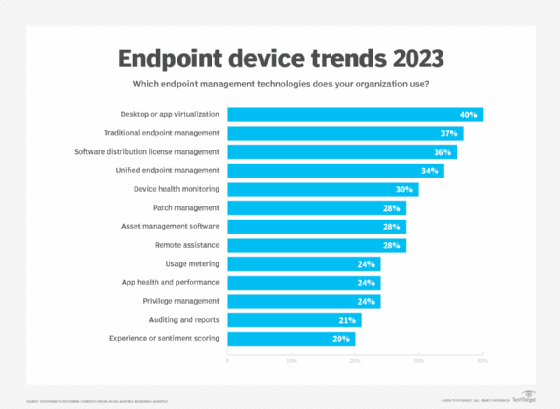
Getty Images/iStockphoto
VMware EUC is now Omnissa: What we know so far
VMware EUC users waiting to see where the products would land after Broadcom's divestiture now have some answers.
It's been nearly two years since Broadcom announced its intent to acquire VMware, which kicked off a long period that generated more questions than answers on the future of VMware end-user computing as well as its products, integrations and partners.
When the deal closed last fall, we started to get some guidance on Broadcom's plans, learning that it intended to divest itself of VMware's EUC division. Earlier this year, we learned that EUC was being sold to private equity firm KKR.
We're finally starting to get some answers. Here's where the VMware EUC portfolio stands today.
VMware EUC is now Omnissa
In April, VMware EUC was renamed Omnissa and a new website, Omnissa.com, launched shortly thereafter. To be clear, Broadcom's deal to sell VMware EUC to private equity firm KKR has not yet officially closed, but getting a head start will hopefully ease the transition for customers.
The new Omnissa website currently lists the following products:
- Workspace One Unified Endpoint Management.
- Workspace One Intelligence.
- Workspace One Mobile Threat Defense.
- Horizon 8.
- Horizon Cloud Service.
VMware App Volumes and Apps on Demand are still there, too, but are mentioned under the Horizon pages. Though I could make a strong argument that they should be included in the main list of products, things are still clearly under construction, so perhaps that will change when the official launch of Omnissa happens.
Likewise, the offerings that are highlighted indicate that Digital Employee Experience, Security and Compliance, Unified Endpoint Management, and Virtual Desktops and Apps remain core to the Omnissa mission.
Putting a name to the company must be a relief and is important at a time when other vendors are trying to elbow their way into the desktop virtualization and endpoint management discussions. While it ultimately is just a name, it also represents a foothold in a transitional era where footholds seemed hard to come by.
Horizon licenses that include vSphere will continue
One of my biggest questions revolved around the vSphere entitlements included with some Horizon term and subscription licenses. As the two companies split, what would that mean for licensing, especially at a time when Broadcom is thought to be significantly increasing the price of vSphere?
According to an Omnissa blog post and a VMware Customer Connect knowledge base article, Omnissa and Broadcom "have entered into a reseller agreement enabling EUC to offer the 'combined offering' versions of Horizon SaaS and Horizon Term SKUs with vSphere Foundation for VDI (which includes vSphere, vCenter, and vSAN). This combined offering will be available in both Named User and Concurrent User license metrics and for 1-, 3-, and 5-year terms."
While not identical to the prior VMware offering, the effect is similar. Nothing changes for existing customers until renewal. At renewal, or upon purchase, customers that opt for Horizon products that include vSphere will receive an entitlement to VMware vSphere Foundation for VDI -- also known as VVF for VDI -- which includes vSphere Enterprise plus, vCenter Standard and vSAN Enterprise.
These developments -- the name and the licensing -- have quelled some of the uncertainty around Horizon, though bigger-picture questions remain.
How will Workspace One fare without the weight of VMware behind it?
Will Omnissa maintain VMware's status as a leader in the EUC market? The good news for everyone is that there's a lot of runway here, so the opportunity for growth is still high. Research from TechTarget's Enterprise Strategy Group indicated that unified endpoint management is deployed in 34% of organizations, compared to 37% for traditional management. Those still using traditional management, plus the 29% that aren't doing either, remain a pretty large market for modern endpoint management companies.

Will Omnissa be able to rebuild VMware's channel?
This might be the next most pressing issue. Broadcom ended the VMware partner program in February, opting for an invitation-only approach. While no doubt some of those invited partners had ties to EUC, they're part of Broadcom's partner program, not Omnissa's. That means Omnissa has its work cut out for it in rebuilding the partner program and mending any fences that need repair.
I can't begin to speculate what a partner program would look like. Perhaps the EUC partner program can just restart as it was before, but it's been several months since Broadcom made its changes, and the partners have had to make decisions to keep their businesses moving forward. For example, desktop-as-a-service provider Dizzion bought Frame from Nutanix in June of 2023 and has since refocused its business on them.
These are high-level questions, and many more exist at lower levels, such as Horizon's integration with vSphere, how fast it can become completely platform agnostic and more.
While it's nice to see Omnissa rising above the dust, there's still a lot of settling to be done. But that's not the takeaway. The key topics today are that Omnissa is here and Horizon licensing will continue more or less as it has, which is more than we could say for the past six months.
Gabe Knuth is the senior end-user computing, endpoint security, and email security analyst for TechTarget's Enterprise Strategy Group. He writes publicly for TechTarget in addition to his analyst work. If you'd like to reach out, see his profile on LinkedIn or send an email to [email protected].
Enterprise Strategy Group is a division of TechTarget. Its analysts have business relationships with technology vendors.








